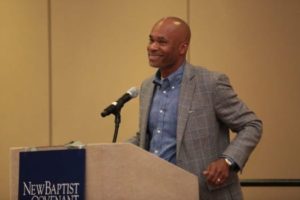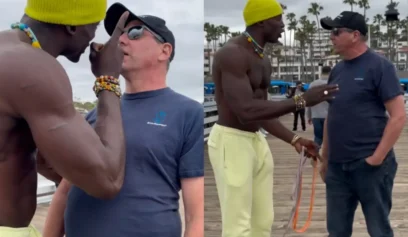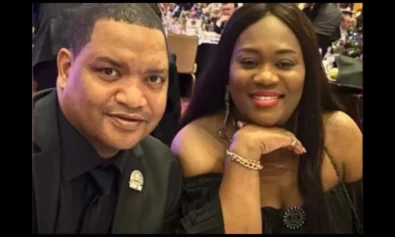
Rev. Darryl Aaron speaks at Cooperative Baptist Fellowship General Assembly in Greensboro, N.C. on June 23. Courtesy CBF.
A North Carolina clergyman believes being Black gives him a slight edge over his white contemporaries when interpreting the Bible.
“When I hear that the last will be first, and the first will be last, that’s not a hard text for me,” said Rev. Dr. Darryl W. Aaron, pastor and senior minister of the historic Providence Baptist Church in Greensboro, N.C, per Baptist News Global. “That’s good news.”
Established one year after the Civil War in 1866, Providence was the city’s first African-American Baptist congregation. Nine years later, it became the first brick-and-mortar house of worship for Black people in the state.
Aaron spoke to the subject of racial justice and segregation within the church before a mixed crowd at a June 23 luncheon. Church representatives from around the country gathered in Greensboro for the 25th annual Cooperative Baptist Fellowship General Assembly — a week-long convention of prayer services, business sessions and workshops.
The University of North Carolina-Charlotte graduate called the Black experience “burdensome” due to the added pressures African-Americans face in the U.S.
Aaron discussed the unique conversations Black parents have with their children.
“If I am not Black, I don’t have to tell [my] son at three years of age never to run out of a store chasing your sister. So what you’re having fun?,” he said.
He referenced media coverage of the 2014 shooting death of Michael Brown, speculating on the impact images of the Ferguson teen lying in the street for hours may have had on a young Black boy.
“He knows he is less valued than others and wonders when the day will come when he too will be shot down.”
But Aaron suggested there was an upside to the Black experience for Christian believers, because, he said, “I know that the gospel is only for those who are burdened.”
“I’m not saying that God made me Black to give me joy,” he added. “I’m not saying that it is God’s plan to allow America to systematically deny Blacks, ignore Blacks — more Blacks in prison, more Blacks today than were jailed in the climax of South Africa’s apartheid — and simply value Black persons less than other.”
“What I am purporting is being Black in such adverse condition, I can see what God has brought to this world is good news.”


